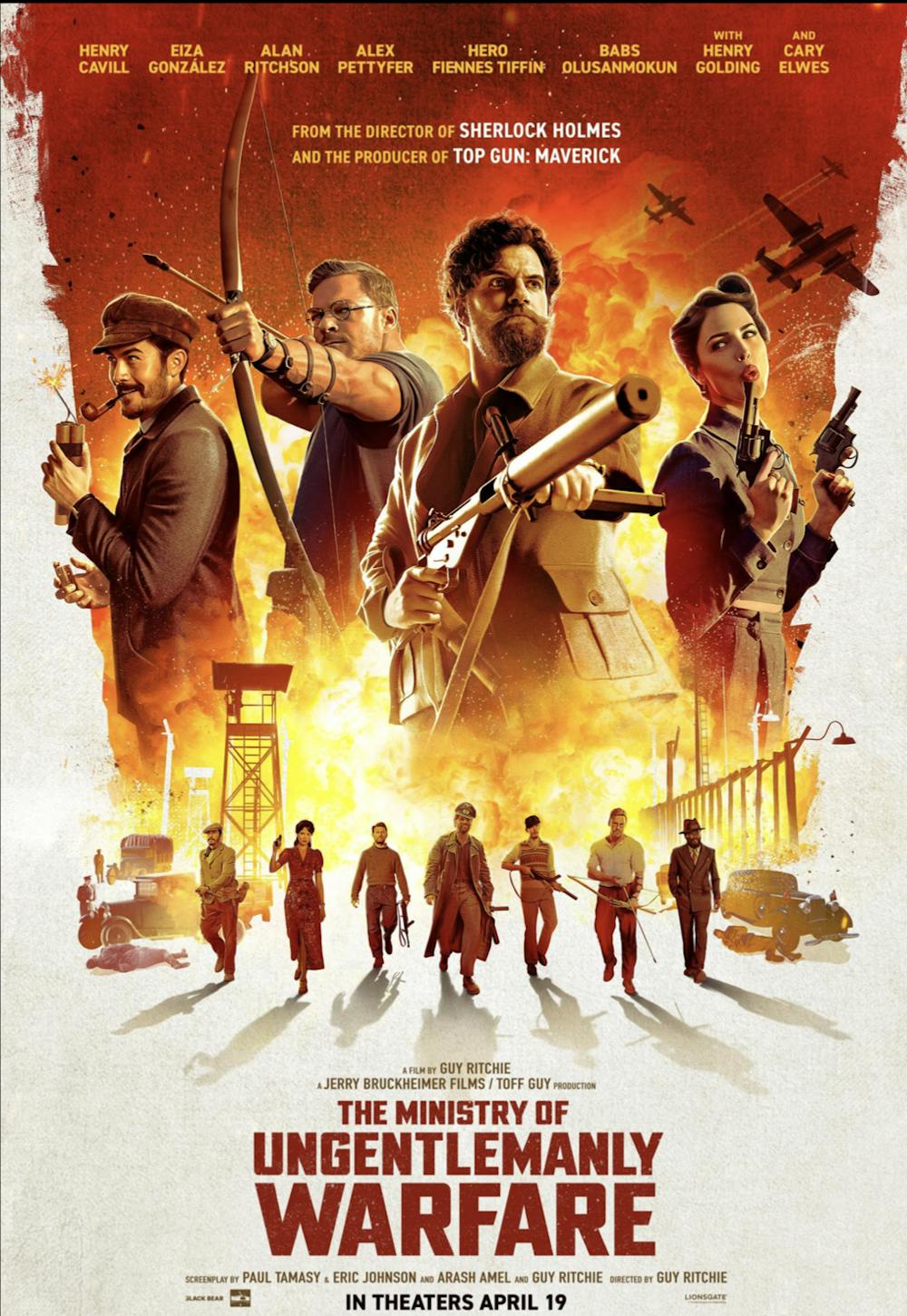By Joshua Hudes
Staff Writer
Guy Ritchie’s 15th feature film “The Ministry of Ungentlemanly Warfare” has arrived in cinemas nearly a year after his last two films.
Since its release in theaters on April 19, the film’s gross domestic box office performance has been somewhat disappointing with a $9 million accumulation on a $60 million budget. This could be attributed to poor marketing campaigning, a lack of an A-list ensemble or a lack of differentiation. Regardless, that is an answer people can only speculate at this point. Whether it has to do with the notion of this being an historical film or with the cast not being as stacked as prior Ritchie outings, what should not be mistaken is how unequivocally this is a product of this writer and director.
“The Ministry of Ungentlemanly Warfare” picks up the baton from previous Ritchie films in allowing itself to be the action-comedy extravaganza it had always intended to be. His body of work is of a consistency and level of devotion to the assignment intended that many filmmakers and artists strain to achieve. This steadfast loyalty in regard to his own artistic decisions comes quite effortlessly to his persistent choice of genre.
Set in 1941 at the height of World War II, the film stars Henry Cavill as Gus March-Phillipps, a military rogue whose prior skillset catches the attention of then-Prime Minister Winston Churchill. March-Phillips is brought on to be a core member of Operation Postmaster, a real-life military operation directly ordered by the Special Operations Executive.
The objective of their mission is to sabotage the transportation of U-Boats by taking away the ability to ship the necessary raw materials overseas from German-occupied colonial ports to Germany. Fernando Po, the shipping port capital of then-Spanish Guinea, is the destination unto which March-Phillipps and his ragtag gang of military comrades must embark to conquer such a task.
While this film does take a significant number of historical liberties within its true-to-life framework, this notion does not undermine how thoroughly entertaining the film remains. The cast of characters fits squarely into Ritchie’s noteworthy brand of quick-witted professionals who, in spite of moral repugnance or pronounced temperament, are remarkable at what they do. The film has little in terms of character advancement and instead finds pure delight in observing characters commit actions which are simply executed well, albeit with a few moments of suspense. A lack of what some might denote as a necessary element in narrative progression appears to be not a bug but a feature.
Luckily, Ritchie has had an abundance of nurtured experience with writing and directing characters like this, making the portrayal of these ragtag misfits appear like a cake walk.
His prior works include gangster films such as “Snatch” and “The Gentlemen,” as well as historical films such as “King Arthur: Legend of the Sword” and “The Covenant.” While many of his films exist only within a few genres, it holds little to no water when it comes to critiquing his art. Many filmmakers like Ritchie continue to dig into their own proverbial themes in order to pluck out new variations of advice and messaging not found beforehand. With this film, Ritchie literally dug up a story which was already hidden from public memory up until around the last few decades. The film is based on “Churchill’s Secret Warriors: The Explosive True Story of Special Forces Desperadoes of WWII” by author Damien Lewis, spotlighting a series of events which were already difficult to cobble together.
What Ritchie’s intentions appear to have been while making what seems like a mixture of a James Bond-type story and an historical recounting is what some media scholars call metamodernism.
This term basically comes down to a work of art such as a film which is both self-aware about its own influences and genuinely accepting of them as a form of tradition. This is the key to unlocking what makes this film such an exhilarating ride to be on. It balances the type of over-the-top action one would find in the “Kingsman” films and the more naturalistic style found in the gritty Daniel Craig “Bond” films. Its camerawork borrows from established forms of blocking born out of films such as “Casablanca,” while also retaining the self-aware nods to filmmaking which make many of Ritchie’s films so kinetic and bombastic.
With all of that said, the film still is not what I would call the finest of its class in terms of historical action cinema. I would not say there exists anything expressly abhorrent about the film and its presentation either, except that, like some other films from Ritchie, its humor and tone might not be people’s taste. It was simply a good time at the theater, which is determined to make one forget about their problems while taking that fact in stride.







